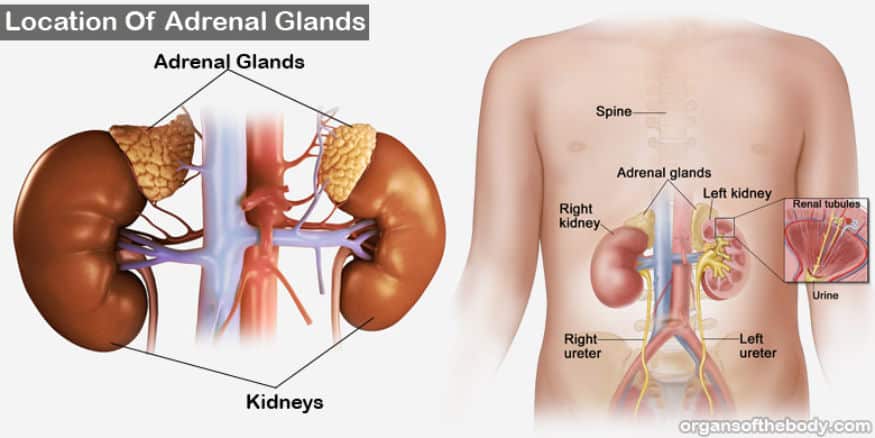
Adrenal Fatigue is a condition that presents itself to people who are under inordinate amounts of daily pressure.
When the human body faces stress, our natural “fight or flight” response kicks into high gear. Of course, your body needs the energy to face whichever response it chooses. It prepares to do battle or flee by producing a hormone called cortisol.
Producing that cortisol is the job of the adrenal hormones, which are located near your kidneys and contribute to your endocrine system. The theory is that continual production of cortisol, needed for the body to cope with stress, can tax the adrenal glands and trigger adrenal fatigue.
Things get more complicated from there. While stress is the primary culprit that triggers this condition, there are others as well:
- An imbalanced microbiome in your gut
- Blood sugar imbalances
- Disruption to the Circadian rhythm
- Genetics
- Toxins we take in from preservatives in our foods and environmental pollutants
Many who struggle with this condition find holistic remedies to manage their symptoms. Most notably, patients find success with:
- Essential oil therapy
- Smoking cessation (and other nicotine products)
- Improving sleep hygiene
- Yoga or other exercises to release stress
- Consuming an anti-inflammatory diet
Adrenal Fatigue: The Diagnosis
Adrenal Fatigue is a tricky diagnosis. Many in the medical community are aware of the symptoms and agree that they exist. However, the determination of “Adrenal Fatigue” is not an accepted diagnosis by the medical community.
There is no test for adrenal fatigue, although a urinalysis can measure your hormones. This lack of clarity makes it difficult to assess patients who struggle with the symptoms.
Regardless of whether the “official diagnosis” exists, endocrinologists agree that something is going on with these patients.
According to Lynnette Nieman, MD, an investigative scientist with the National Institute of Diabetes and Digestive and Kidney Diseases,
“Our role is to be good active listeners to determine if there is a true medical disorder lurking among the complaints. It is very important to take the person seriously, not to brush them off and say there is no [such thing as] adrenal fatigue. These people are suffering from something, so we need to take the suffering seriously.”
–Dr. Lynnette Nieman
So, what are those symptoms that Dr. Nieman is referring to? Let’s take a look.
Symptoms of Adrenal Fatigue
The signs of adrenal fatigue are far-reaching and can impact almost every part of the human body.
Autoimmune Conditions
Autoimmune conditions occur when the body is so confused by its own hormones that, in essence, it starts to attack itself by overproducing antibodies. In the case of Adrenal Fatigue, the attack waged is on the adrenal cortex, the outermost section of the adrenal glands.
The best known of the autoimmune conditions stemming from Adrenal Fatigue is Addison’s Disease. AD occurs when the body doesn’t produce an appropriate level of cortisol. This condition is dangerous because it’s often chalked up to less severe ailments and not diagnosed until it becomes life-threatening.
Chronic Fatigue

Are you always tired? If you still feel worn out, even after what should be a good night’s sleep, it’s a clear indication that something is “off” inside your body.
There is no specific medical test for Chronic Fatigue. Based on information provided by the American Academy of Family Physicians, it’s diagnosed in patients who have an ongoing inability to feel rested over a six-month period. For a diagnosis, patients also experience at least four additional co-existing conditions, including:
- Lack of focus or concentration
- Headaches
- Muscular aches
- A general feeling of unwellness
- Disrupted sleep patterns
- Headaches
- Swollen lymph nodes
Sleep Disturbances
Some of that chronic fatigue stems from sleep disturbances that are not unusual in Adrenal Fatigue.
This often comes from stress. However, a secondary cause of Adrenal Fatigue is a disruption to your body’s Circadian rhythm.
This 24-hour cycle is your body’s natural clock. It dictates when you are awake and when it’s time to sleep.
It can get knocked off-cycle by an external condition—like seasonal changes in the total amount of daylight. Or, it can become confused by internal factors, like hormonal changes or bipolar disorder.
“Brain Fog”
Do you walk around feeling like you are in a daze? That’s often called “Brain Fog.” It’s a non-specific condition that can be mistaken for a migraine or an oncoming bout of the flu virus. But, when the situation doesn’t resolve—and drags on for days or weeks on end—it is symptomatic of Adrenal Fatigue.
So, even as it makes you feel poorly, it can also cause depression or a feeling of being impaired. This leads to danger when you’re driving or even trying to make a clear-headed decision. You should treat an extended round of Brain Fog seriously.
Hair Loss

Those who suffer from Adrenal Fatigue, both male and female, report hair loss. If you find that your hair is thinning, or often find large clumps of hair in your brush every day, it’s an indicator of an imbalance in your body.
In the case of Adrenal Fatigue, holistic practitioners believe that because your body shifts primary focus to cortisol production in preparation for a perceived “fight or flight,” it lessens the delivery of nutrition to other parts of the body—including your hair.
Hormone Imbalance
All that cortisol imbalance wreaks havoc on all the hormones in your body. Your adrenal glands do more than just manufacture cortisol (at least under normal conditions!). They should also regulate your metabolic function, heart health, blood circulation, blood sugar, and sex hormones. Any—or all—of these functions can be turned upside down by the overproduction of cortisol.
However, when they are distracted by a threat (real or imagined), their primary goal is to manage stress.
Weakened Stress Response
Another symptom of Adrenal Fatigue is a weakened stress response. Your body is expending so much effort fighting off perceived stress that it’s not preparing for a genuinely stressful situation. As a result, you may feel overwhelmed or incapable of dealing with the day to day stress in your life.
Insulin Resistance and Weight Gain

These two symptoms are linked together because we can’t examine one without the other.
The adrenal glands play a highly significant role in helping your liver convert the sugar glycogen into glucose to deliver to your body’s cells by releasing hormones called glucocorticoids. An imbalance in that release causes an excessive amount of sugar in the blood and the inability to work with the insulin released by the pancreas efficiently.
The result of this is a condition called insulin resistance. Insulin resistance leads to unexplained weight gain, prediabetes, or Type 2 Diabetes.
The Centers for Disease Control and Prevention CDC estimates that 84.1 million Americans struggle with prediabetes, and the weight gain you may be experiencing is a red flag that you should be tested.
Lightheadedness
Lightheadedness, or the feeling that you could pass out, frequently happens when you stand up. This sometimes stems from a sudden drop in your blood pressure during a sudden motion.
You might be curious about why you are experiencing this, and the answer could be Adrenal Fatigue.
A secondary function of your adrenal glands is regulating your body’s mineralocorticoids. These are the hormones which help your body maintain its blood pressure at a healthy level. When they become imbalanced, you may suffer from low blood pressure.
Decreased Sex Drive (Libido)
Now that you’ve been reading about how many essential functions the adrenal glands serve, it is probably no surprise to you that they also help regulate our estrogen and testosterone levels.
Just as imbalanced adrenal glands can have negative impacts on other organs, sexual desire, sex drive, and sexual performance can feel the effects, also.
If you have been experiencing a loss of interest in sex, despite a remaining attraction for your significant other, this could be one of the possible causes.
Moodiness, Depression, and Irritability

Moodiness and irritability go hand in hand with Adrenal Fatigue. Let’s face it. You probably feel tired a majority of your day, your blood sugar is out of whack, and you feel foggy. Because so many hormonal processes are being turned upside down by your condition, it’s no surprise that you are snappy, easily frustrated, and feeling wide mood swings, including depression.
If your doctor has ruled out other potential culprits (i.e., a mental health condition), but he can’t provide an explanation for your moodiness, Adrenal Fatigue may be the root cause.
Muscle or Bone Loss
Those who suffer from the worst cases of Adrenal Fatigue, such as Addison’s Disease, often express joint pain or tender or painful muscles.
These are concerning symptoms. According to over a decade of research (which is still ongoing), this wasting of muscles and bones is still being investigated but is confirmed to be linked to adrenal insufficiency, or the over- or under-production of hormones by the adrenal glands.
Skin Ailments

When your adrenal glands are not functioning well, you can suffer from a sudden onset of skin conditions that you’ve never experienced in the past.
Some of the new conditions you may encounter include:
- Hyperpigmentation, dark spots on the skin
- Darkening of the lips or the tissue inside the mouth
- Dry skin patches, even though you don’t typically have a drier skin type
- Dark circles around and under the eyes
These are indications of Addison’s Disease, and you should seek help from your physician.
Sweet and Salty Food Cravings

You already know by now that your adrenal glands regulate your glucocorticoids and blood sugar. Additionally, they control yet another hormone—aldosterone. Aldosterone does the vital chore of maintaining a healthy balance of salt and water in your body.
So, when your glucocorticoids are off-kilter, you can experience intense cravings for sweets. And, when your aldosterone is in a state of imbalance, you might feel a desire to consume salt.
These cravings are your body’s way of signaling to you that you are missing a little something; now, all you have to do is listen!
Note that while these symptoms point to Adrenal Fatigue, they are also key indicators of other medical conditions. Be sure to seek guidance from your family doctor to rule out other possible causes.
Essential Oils for Adrenal Fatigue
Fortunately, many who suffer from these symptoms can find relief at-home by using essential oils as part of their therapy.
1 – Sweet Basil Essential Oil
Sweet Basil Essential Oil has natural stimulant properties that can boost you out of the fog, awaken you, and uplift your spirits.
Diffuse Sweet Basil Essential Oil in your office throughout the day to fight work-related stress and energize you.
2 – Lavender Essential Oil
If your sleep is often disrupted or you have a hard time nodding off at night, try Lavender Essential Oil. Lavender naturally relaxes your body, eases your mind, and helps you relax.
Create a custom bathing salt blend with:
- 1 cup of coarse sea salt
- ¼ cup of baking soda
- 1 cup of Epsom salt
- 20 drops of lavender essential oil
Mix your bathing salts, store them in a pint jar, and infuse hot bath water with two tablespoons before retiring.
3 – Rosemary Essential Oil

Rosemary Essential Oil is perhaps best known as a treatment that improves memory and focus.
It’s been used for this purpose for centuries, as famously noted:
“There’s rosemary, that’s for remembrance.”
Hamlet, William Shakespeare
Besides improving memory, rosemary also relieves sore, tender muscles and joints.
Apply rosemary topically in a carrier oil to fight the achy joints and muscles associated with Adrenal Fatigue. It works fantastic in a roll-on, so that you can keep it with you all the time.
Diffuse Rosemary Essential Oil to inhale it and improve your concentration.
4 – Wild Orange Essential Oil
If you are battling brain fog, sleepiness, mood swings, or depression as part of your adrenal imbalance, look to Wild Orange Essential Oil to ease your symptoms.
The invigorating, citrusy aroma stimulates your senses and lifts you from the fog.
Blend wild orange essential oil with sweet almond oil and apply the mixture to the pulse points of your wrists. Throughout the day, or whenever you need an energy boost, inhale the fragrance. Wild Orange Essential Oil is also very effective when applied to a diffuser necklace.
5 – Grapefruit Essential Oil

Grapefruit Essential Oil aids in the detoxification of your adrenal fatigue and supports recovery as you stabilize adrenal functions. The uplifting, mild citrus aroma helps you stave off chronic fatigue, boosts memory, and helps fight sugar cravings as you heal.
Make a blend of 6 drops of Grapefruit Essential Oil and two tablespoons of a carrier oil. Ask someone in your home to massage it into the skin above your adrenal glands. Not sure where to find them? They are located behind your lungs (closer to the bottom) and above the kidneys.
See diagram:

6 – Clove Essential Oil
Clove Essential Oil is packed with antioxidants that help support your immune system, which is compromised during times of adrenal fatigue.
Clove Essential Oil is an all-around winner in the battle against adrenal fatigue. Its spicy fragrance boosts your energy levels and helps you clear your head. Finally, it helps improve your circulation, helping to stave off the lightheaded feelings you might be experiencing.
Diffuse Clove Essential Oil whenever you need a lift. In the morning, cover the floor drain of your shower with a washcloth, flick a few drops of clove essential oil to the cloth, and fill your senses with clove-infused steam that will really help you awaken for the day.
7 – Geranium Essential Oil
Geranium Essential Oil has a lush, floral aroma that uplifts and stabilizes your mood and supports kidney and liver health—important because those organs work in tandem with the adrenal glands.
Diffuse Geranium Essential Oil to lift up your mood when you feel depressed. Or, make a massage oil from 5 or 6 drops of oil in two tablespoons of a carrier oil. Massage it over your abdomen and back to detoxify your organs.
Best Essential Oil Blends for Adrenal Fatigue
Want to get the best relief for your overworked adrenal system?
Consider custom-blending two or more of the best essential oils for adrenal fatigue to get optimal results.
Here are some suggestions:
Adrenal Support Diffuser Blend

Simple but effective, this blend will lift your mood out of the gutter and help awaken your senses. You’ll feel better, fast!
- 3 drops of Geranium Essential Oil (to regulate your mood swings)
- 3 drops of Wild Orange Essential Oil (to combat sleepiness or fatigue)
Detoxifying Massage Oil

Gently massage this blend over your entire body. Pay special attention to the area near your adrenal glands and any sore or achy muscles or joints.
- 3 drops of Grapefruit Essential Oil (fights sugar cravings)
- 3 drops of Rosemary Essential Oil (eases sore muscles)
- 2 drops of Clove Essential Oil (to support the healing process)
- 6 tablespoons of carrier oil
Hair Mask

Losing your hair? Support hair health by strengthening the follicles and hydrating your scalp to help offset this loss.
Wash your hair and then apply this luscious, fragrant mask while you shower. Rinse well. Your hair will appear instantly healthier and will be a little more resistant to damage. Plus, the aromas will elevate your moods.
- ¼ cup jojoba oil
- 3 drops Grapefruit Essential Oil
- 3 drops Rosemary Essential Oil
Double the amounts for long hair.
Can CBD Oil Improve Adrenal Fatigue?
Cannabinoids (CBD) are the active compounds that deliver therapeutic benefits in cannabis products. Legal CBD Oils, which contain less than .03% THC (the compound that makes a person feel high) are known to be safe and effective in lessening the symptoms of adrenal fatigue.
One recent study, conducted in October of 2018, suggests that CBD oil does help the body fight stress and calms frazzled nerves. However, it does not find conclusive evidence that it slows down the body’s production of cortisol.
This suggests that it may relieve the symptoms but won’t cure the cause of the Adrenal Fatigue. Therefore, use CBD oil with discretion and remembering that while you’re taking the edge off of your mood and relaxing from your stress, you will still need to make other lifestyle adjustments to get back on track.
Recovery from Adrenal Fatigue
Healing your adrenal fatigue is an ongoing process that can take anywhere from a few months to two years. For some, especially those who have genetic triggers, you may need to make lifelong changes to your lifestyle. There is not any one-size-fits-all solution to the underlying issues that cause adrenal fatigue.
It’s frustrating for sufferers because it’s a long cycle back to health. And, that’s a bitter reality when your hair is falling out with every stroke of the hairbrush, and your mood swings get the better of you day after day.
Combining aromatherapy with improved eating habits, yoga, smoking cessation, and other healthy lifestyle choices takes a long commitment that only happens over time.
Final Thoughts
While the medical community accepts the symptoms of Adrenal Fatigue, they refuse to put a label on the illness itself. If you have ongoing challenges or the symptoms described above, and your physician is just as puzzled as you are, don’t accept a lifetime of feeling poorly as a valid option.
Take charge of your health, Begin the aromatherapy treatment and make those other improvements to your lifestyle to support adrenal function.

